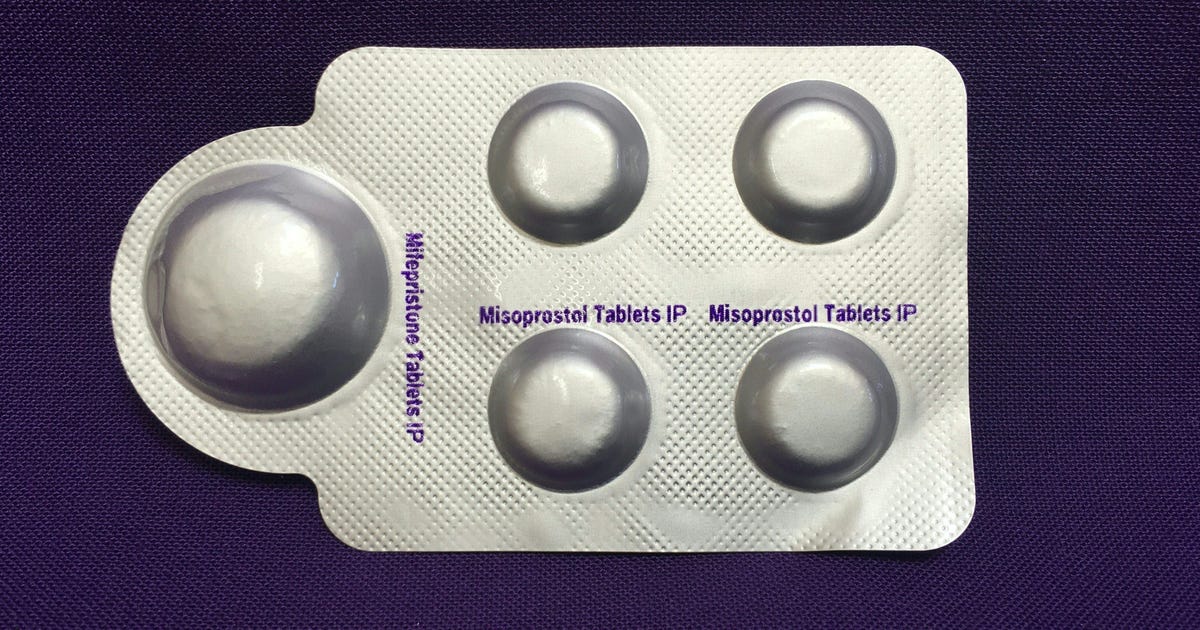
The future of medication abortion is teetering in lawsuits over the availability and legality of mifepristone, the first of two drugs used in the procedure.
In late February, attorneys general from about a dozen Democratic-led states sued the US Food and Drug Administration over regulations they say are medically unnecessary and are meant to make it harder for people to get mifepristone. The FDA has loosened some of the restrictions over the last couple of years, but a mifepristone prescription still carries many qualifications under a Risk Evaluation Mitigation Strategy, aka REMS.
But others claim that the FDA’s rules aren’t tight enough. Whether mifepristone is even able to stay on the US market could depend on the ruling of one judge in Texas, which has already banned abortion for the state with narrow exceptions, and the ruling could come in any day. In part, the lawsuit claims the FDA never had the right to approve mifepristone in the first place, and it questions the safety of the drug despite medical organizations continuing to uphold it as safe. If the judge agrees, the case has the potential to ban mifepristone and change how medication abortion is done even in states where abortion is legal, though a cascade of other legal steps and appeals are expected to follow immediately.
Medication abortions are typically limited to the first trimester of pregnancy and account for a growing number of the total number of US abortions — currently more than half. Medical organizations including the American Medical Association and the American College of Obstetricians of Gynecologists say mifepristone is safe. Patients may choose medication abortion because it’s done in the privacy of their home and can be more accessible or less expensive than the in-clinic procedure. After the US Supreme Court overturned Roe. v. Wade last spring, restricting abortion pills became a priority for lawmakers trying to ban or limit abortion.
Whatever the judge in Texas rules, a stream of appeals and other court moves are expected to follow, which makes it difficult to say for certain what will happen to mifepristone. Health care providers and legal experts alike say this is par for the course post-Roe v. Wade, when the future and legality of medication used in pregnancy and abortion is up to state actors and the courts.
But in the Texas case, specifically, the FDA’s approval process is called into question. If the judge revokes the agency’s 20-plus year approval stamp of a drug, it would be overriding the FDA’s own calculations on a drug’s benefits and risks — an “unprecedented” move in US medicine regulation, according to an article in The New England Journal of Medicine. Even if mifepristone stays on the market, the case has opened the door for the potential removal of other drugs and medications from the market, regardless of what medical consensus is.
What is mifepristone, and what is the Texas case about?
Mifepristone is a drug that’s used in medication abortions in the first trimester as well as early miscarriage treatments. It temporarily blocks progesterone, a hormone needed to keep and develop a pregnancy. Patients using it for abortion take it before misoprostol, a drug which induces uterine contractions, to start the end of the pregnancy. Patients who’ve had a miscarriage might also take it to help their body stop behaving as pregnant when the pregnancy is no longer viable and the embryo or fetus has stopped developing.
By itself, mifepristone alone is not especially effective at ending a pregnancy, which is why the FDA approved it specifically for use alongside misoprostol, a drug originally meant for stomach ulcers and other health conditions. Misoprostol is technically used off-label for induced abortion (commonly just “abortion”) or spontaneous abortion (miscarriage).
Mifepristone has been in the spotlight in abortion debates because its sole purpose and approval is for pregnancy termination.
The plaintiffs in the Texas case include the Alliance for Hippocratic Medicine, a health care group against abortion and similarly socially divisive yet medically based topics, like medially assisted suicide. The suit claims that the FDA never had the authority to approve mifepristone and that it has harmful side effects. The suit also takes issue with pregnancy as an illness, and the FDA regulating mifepristone as if it were. The actual threat to mifepristone’s future on the market depends on a few factors.
Impact on FDA’s drug regulations
“If the court decides against FDA, part of how much of a threat it is depends on how the opinion is written,” I. Glenn Cohen, a Harvard law professor and faculty director of the school’s Petrie-Flom Center for Health Law Policy, said in an email. Cohen is also a signatory to an FDA law scholar amicus brief for the Texas case, and an author in an article on the case published in The New England Journal of Medicine. An opinion could be more narrow and focused on pregnancy, or it could be written broadly, Cohen said. If it’s broad, it has the potential to influence rulings over other medications for other health conditions. But it would start a lengthy process that involves the Department of Justice and other factors, according to Cohen.
Cohen added that nationwide injunctions that “essentially allow a single district court judge anywhere in the country to make a decision for the whole country” have garnered a lot of skepticism, including from two conservative Supreme Court justices.
If the judge rules in favor of the Alliance for Hippocratic Medicine and revokes the FDA’s 20-plus year approval stamp, it would be overriding the FDA’s benefits vs. risk calculations. For a judge to get around this “congressionally created process” in drug regulation would be unprecedented, Cohen and the other authors write in the article. The scope of the injunction — whether mifepristone is banned on a nationwide level — would need to be determined in other courts, and such a decision has the potential to go all the way to the Supreme Court.
Not only could the way the FDA weighs the benefits and risks of medication be altered, but the courtroom door would be opened to removing other drugs from the market outside of the ones used in pregnancy or abortion, including vaccines and gender-affirming drugs that have become politicized by lawmakers. And as reported in Slate, the fate of medication abortion also hinges on how much power the FDA retains, and how it uses its enforcement discretion.
But the FDA is not the final frontier in an attempt to stop medication abortions. Also in Texas, lawmakers introduced a bill last week that aims to block websites with information on medication abortion drugs or sites where people can find the pills, which would include overseas pharmacies like AidAccess. Even in states where abortion is currently banned, people can order pills from these sites because they aren’t regulated by the FDA.

Sarah Silbiger/Getty Images
Medication abortions can continue with misoprostol only
Misoprostol by itself is the other recommended method of medication abortion, and may already be a go-to regimen for many people in non-wealthy countries that don’t have access to mifepristone.
Many health care providers are expected to continue prescribing misoprostol for medication abortions where abortion is legal, including online. Monica Cepak, chief marketing officer of the sexual and reproductive telemedicine site Wisp, said misoprostol would still be available to patients in the event mifepristone was banned.
And despite the results of the ongoing court cases, medication abortion pills will still be available at overseas pharmacies like AidAccess, and surgical abortion will remain an option where state laws allow.
But while studies show misoprostol alone is effective by itself at ending a pregnancy, it’s not exactly as effective as the mifepristone-misoprostol combination and may cause more pain and side effects, including the need for follow-up care in the emergency room if someone’s body doesn’t pass the pregnancy, says Dr. Glenmarie Matthews, an OB-GYN and assistant professor at Rutgers’ Robert Wood Johnson Medical School. She says a call for banning mifepristone just takes a safe procedure and makes it less safe.
Will providers still be comfortable providing misoprostol-only abortions?
“It’s not a matter of feeling comfortable,” said Matthews. “We will still have to do medication abortion with misoprostol because women will still need medication abortion.”
Even if the judge in Texas doesn’t rule in a way that blocks mifepristone nationwide, lawsuits like it still affect abortion because they add to the stigma, according to Dr. Jennifer Lincoln, an OB-GYN in Portland, Oregon, and director of Mayday.Health.
“It’s just further restricting and adding unnecessary shame and stigma to medications that have over 20 years of data that are completely safe,” Lincoln said, adding that medication abortion pills “send less people to the hospital than Tylenol and Viagra do.”
Matthews says that bans on medication abortion increase the existing gaps in health care access across the US.
“Of course, people of color and of lower socioeconomic status are again going to be more impacted because they’re the ones that are not going to have the resources to get their medication,” Matthews said, referencing the existing burden of getting misoprostol from pharmacies that may already be reluctant to give misoprostol to people who are pregnant.
The US has the highest maternal mortality rate of all the wealthy countries. Black women are about three times more likely to die in pregnancy, childbirth or the postpartum period.
The information contained in this article is for educational and informational purposes only and is not intended as health or medical advice. Always consult a physician or other qualified health provider regarding any questions you may have about a medical condition or health objectives.
